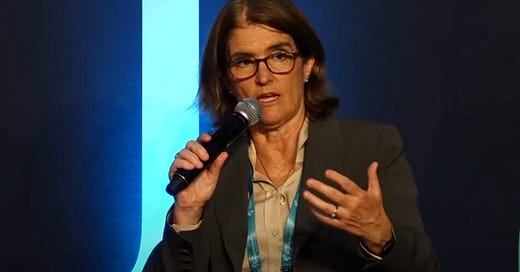Cash Tax: Head Of Reserve Bank Of Australia Suggests Implementing Additional Fees To Use Cash To Shift Towards A Cashless Society
“I think it’s really important that we keep in mind that we’ve got to bring people with us for purposes of financial inclusion.”
The following report was first published on December 12th, 2023, on winepressnews.com.
Michele Bullock, the new Governor of the Reserve Bank of Australia (RBA), suggested during a recent summit meeting that having lending institutions and banks charge customers an additional fee to use cash would aid in the country moving towards a cashless society.
The idea was introduced yesterday during the Australian Payments Network Summit in Sydney, speaking on the central bank’s intentions to modernize the financial networks in the country going into 2024. Bullock read-off a prepared report the RBA released for the summit which explains this transition.
Australia has been a leading nation in making the transition to going cashless, which was addressed in Bullock’s speech. The WinePress has detailed the country’s major shift toward a near-total digital landscape. Australians hardly use cash these days, just sitting at 6% for of all point-of-sale transactions in 2022 were with cash. Because of this, the largest banks across the country are no longer allowing cash withdrawals at many tellers. Australian media and economists have said that by 2025 the nation will be “functionally cashless.” At the same time, the country is seeking to implement digital IDs, both provincially and federally.
So, during the Q&A session after Bullock gave her speech, the moderator asked her: “Do we need to start reflecting on the true cost of processing cash for businesses and, therefore, not represent it as a fee-free option for customers while always charging customers when they use their credit card when there is no other option, really?”
In response, the Governor insinuated that a built-in tax to help phase out cash might prove effective. She said,
“Look, it is a good question. And the issue with cash has always been that businesses don’t really understand, I think, the costs of cash in their business. They are at the moment, I think, understanding it a bit more, but in the past they haven’t really. They have called shrinkage as their main cost which basically means theft but really, they haven’t really internalized, if you like, the costs of processing.
“I think the challenge with cash is that it really does have a big community, public service sort of aura attached to it. If you try to charge people to use cash, they are prepared to pay to get it out of an ATM; but if businesses started charging people to use cash, I suspect there would be a very big backlash.
“Having said that, it is also true that as economists, you want people to face the prices of using particular services that reflect the cost of those services. So, at the moment I think we’re probably in a position where it’s very difficult to actually enforce payment for cash – what’s going to happen and what does happen at the moment is that the costs end up embedded in the costs of the financial institutions that are providing the services, and people don’t face them. I think it would be a very big challenge, though, to get people to face the costs of cash.”
All throughout Bullock’s speech, she emphasized that the RBA is not trying to eliminate cash and that the RBA still wants its use, including checks, to be available for those who want to continue to use it. This was the same reasoning the European Central Bank (ECB) gave when they announced the next phase of their central bank digital currency (CBDC) piloting. “Cash is here to stay,” ECB President Christine Lagarde said.
Earlier in the Q&A, Bullock had said that her own daughter did not know what a check was, but still recognized that some people still do use them. She said,
“I think while we are transitioning away from legacy systems, I think it’s really important that we keep in mind that we’ve got to bring people with us for purposes of financial inclusion. So, it is not a direct mandate, but I think it’s got a very important overlay on to the work we’re doing in the transition.”
During her speech she also claimed that “we also remain focused on access to cash for Australians.”
During her speech, Bullock laid-out the five main tenets the RBA will be focusing on in 2024; which are instant transfer payment systems, further advancement on their CBDC, cross-border payments, and tokenization. Bullock said:
“The first priority is to strengthen the resilience of Australia’s payments and market infrastructures. Businesses and consumers are more reliant on electronic payment systems than ever before, with outages becoming increasingly disruptive to everyday life. We are therefore stepping up our oversight of these systems, particularly the New Payments Platform (NPP) and the card schemes.
“The second priority is to advance and implement the Government’s payments reforms. These reforms will modernize the regulatory architecture and ensure the RBA can continue to promote a safe, efficient and competitive payments system.
“The third priority is to promote competitive, cost-effective and accessible electronic payments. Consumers and businesses are benefiting from new payments technologies that are more flexible and easier to use. But greater use of these electronic methods is also adding to payment costs for businesses. We expect payment service providers to help merchants lower their payment costs by implementing least-cost routing. We also expect financial institutions to deliver more fast payment capabilities to consumers and businesses through the NPP. In particular, the NPP’s PayTo service will help to modernize how we make direct debits, giving customers greater visibility and control over these payments.
“The fourth priority is to enhance cross-border payments. Australia is working with other G20 countries to make cross-border payments cheaper, faster, more transparent and more accessible. One key initiative is standardizing the messages associated with cross-border payments – what information is mandatory for such payments, what is optional and how it is presented in the message. I recently chaired an international working group that developed such harmonized messaging requirements for cross-border payments. The aim is to implement these requirements globally by 2027. The operators of systems processing cross-border payments in Australia have publicly stated their intention to meet these requirements on that timeline. We expect financial institutions to also be ready to use the standardized messaging by 2027 so that their customers can enjoy more seamless cross-border payments.
“Another key initiative is the NPP’s International Payments Business Service, which will allow the Australian dollar leg of inbound cross-border payments to be processed via the NPP on a real-time 24/7 basis. This service was due to be implemented by all NPP participants this month, but some of them are not ready, which is disappointing. We expect the Australian payments industry to deliver on this commitment as soon as possible.
“Our fifth strategic priority is to shape the future of money in Australia. This year, we completed a research project that explored potential use cases for a central bank digital currency (CBDC). Building on this, we are now planning a project that will examine how different forms of digital money and infrastructure could support the development of tokenized asset markets in Australia. We are looking forward to continuing our engagement with industry on this work.
“We are also continuing to work closely with the Treasury in exploring the policy case for a CBDC in Australia. We expect to release a joint paper in mid-2024 that will take stock of the CBDC analysis in Australia so far and lay out a roadmap for future work.”
The WinePress reported on the central bank’s findings for their CBDC trials. SEE: Australia Contracts Mastercard And Others To Test CBDC Payment System, Used To Facilitate ‘Carbon Credit Units’
Bullock also explained that the RBA is looking to transition away from their old Bulk Electronic Clearing System (BECS, also known as Direct Entry) to more modern payment systems, which they call the New Payments Platform (NPP); saying that “the payments industry, through AusPayNet, has been discussing whether to transition away from BECS and has recently decided to retire the BECS framework with a target end date of 2030.” She added: “the NPP incorporates the PayID addressing service, allowing payments to be addressed to an email address or phone number, and it also provides a confirmation of payee service. These features help to reduce mistaken payments and combat some scams.” Bullock urged the major financial institutions to make the switch for their customers to the NPP.
AUTHOR COMMENTARY
Don’t you just love how this two-faced liar keeps emphasizing that they want to keep cash around for those who want it, and then when it gets to the Q&A she then insinuates that major institutions should implement a tax for using cash?
The “cost” here of transitioning from physical cash is our people’s freedom and privacy being stripped away, with the government and central banks knowing what we do at all times. Of course, none of these people will ever say that outload. But the Aussies don’t seem to understand that, and have voluntarily allowed the illusion of convenience to have their most basic freedoms stripped right out from under them. It’s sad, but you reap what you sow.
This trend towards a cashless society will REALLY accelerate at sonic speed next year, so buckle-up for it. They are going to try and make our lives so hard these next years moving ahead.
Proverbs 22:7 The rich ruleth over the poor, and the borrower is servant to the lender. [8] He that soweth iniquity shall reap vanity: and the rod of his anger shall fail.
Proverbs 11:15 He that is surety for a stranger shall smart for it: and he that hateth suretiship is sure.
[7] Who goeth a warfare any time at his own charges? who planteth a vineyard, and eateth not of the fruit thereof? or who feedeth a flock, and eateth not of the milk of the flock? [8] Say I these things as a man? or saith not the law the same also? [9] For it is written in the law of Moses, Thou shalt not muzzle the mouth of the ox that treadeth out the corn. Doth God take care for oxen? [10] Or saith he it altogether for our sakes? For our sakes, no doubt, this is written: that he that ploweth should plow in hope; and that he that thresheth in hope should be partaker of his hope. (1 Corinthians 9:7-10).
The WinePress needs your support! If God has laid it on your heart to want to contribute, please prayerfully consider donating to this ministry. If you cannot gift a monetary donation, then please donate your fervent prayers to keep this ministry going! Thank you and may God bless you.






Michele Bullock a tranny? Looks like a MAN to me!
Get rid of this scab just another free loader